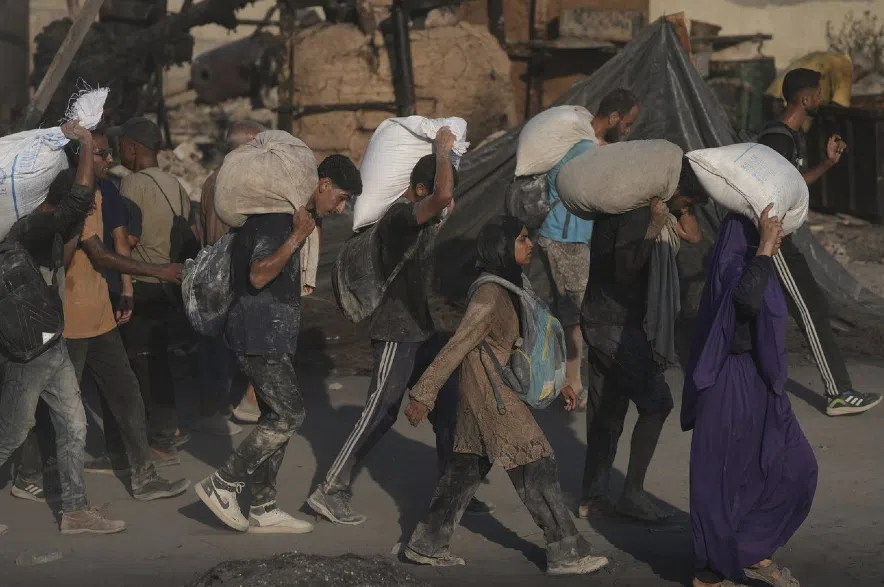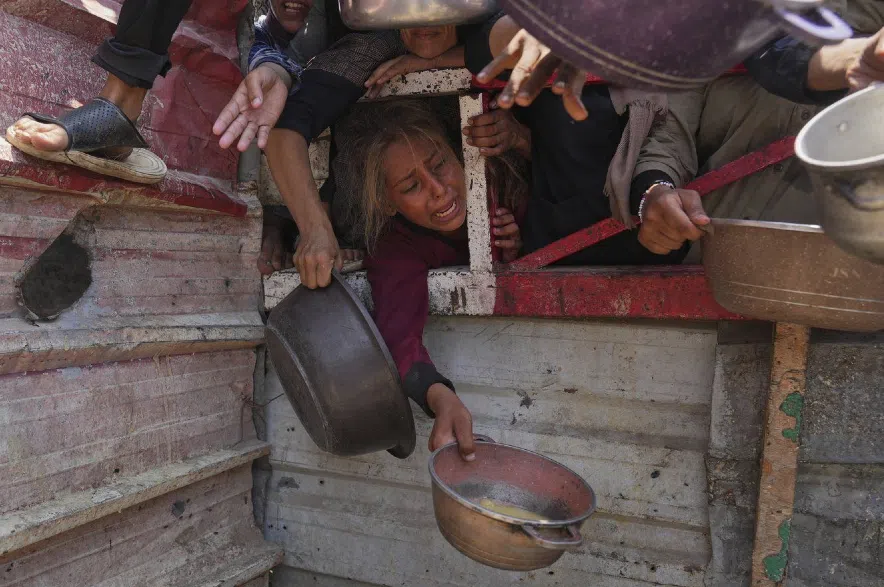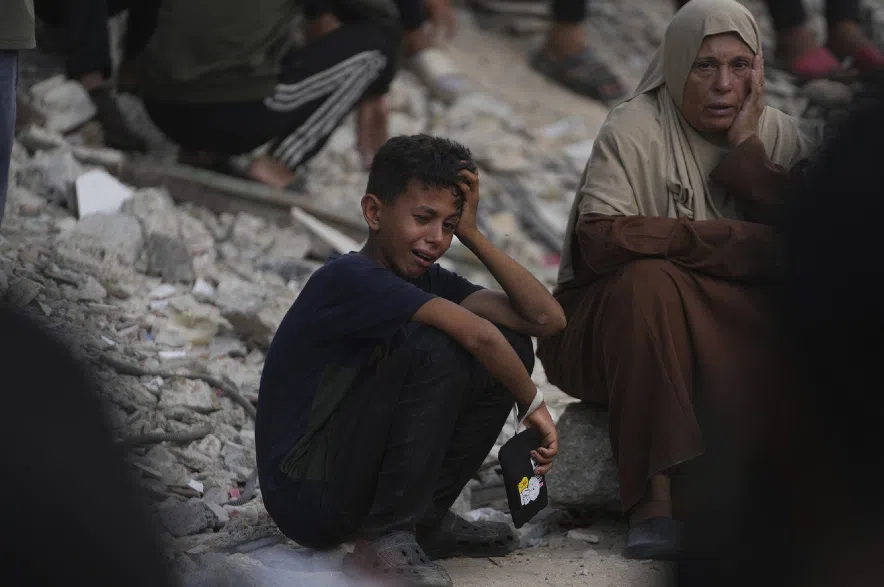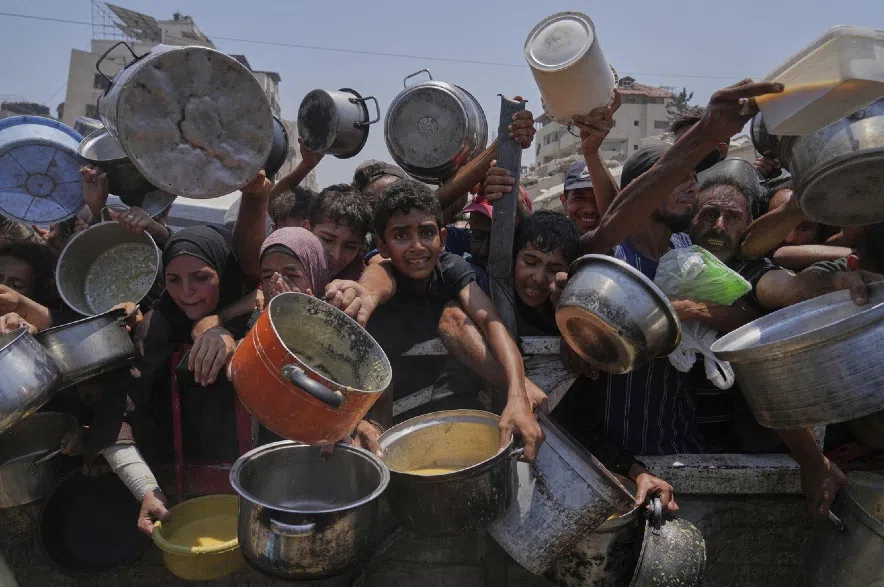DEIR AL-BALAH, Gaza Strip (AP) — Israel’s military says airdrops of aid will begin Saturday night in Gaza, and humanitarian corridors will be established for United Nations convoys.
The statement issued late Saturday came after increasing accounts of starvation-related deaths in Gaza following months of experts’ warnings of famine. International criticism, including by close allies, has grown as several hundred Palestinians have been killed in recent weeks while trying to reach aid.
Read more:
- 32 Palestinians shot dead trying to reach food distribution sites, Gaza authorities say
- Canada joins 24 nations calling on Israel to end war in Gaza, aid restrictions
- Poll suggests half of Canadians believe Israel is committing genocide in Gaza
The military’s statement did not say when the humanitarian corridors for U.N. convoys would open, or where. It also said the military is prepared to implement humanitarian pauses in densely populated areas.
The statement added that the military “emphasizes that combat operations have not ceased” in Gaza against Hamas. And it asserts there is “no starvation” in the territory.
The airdrops were requested by neighbouring Jordan, and a Jordanian official said they mainly will consist of food and milk formula. The United Arab Emirates said airdrops would start “immediately.”
Britain plans to work with partners to airdrop aid and evacuate children requiring medical assistance, Prime Minister Keir Starmer’s office said.
But the head of the United Nations agency for Palestinian refugees, Philippe Lazzarini, warned that airdrops are “expensive, inefficient and can even kill starving civilians,” and won’t reverse the increasing starvation or prevent aid diversion.

Palestinians carry sacks of flour unloaded from a humanitarian aid convoy that reached Gaza City from the northern Gaza Strip, Saturday, July 26, 2025. (AP Photo/Jehad Alshrafi)
53 killed seeking aid, Palestinian officials say
Israeli airstrikes and gunshots killed at least 53 people in Gaza overnight and into Saturday, most of them shot dead while seeking aid, according to Palestinian health officials and the local ambulance service.
Deadly Israeli gunfire was reported twice within hours close to the Zikim crossing with Israel in the north.
In the first incident, at least a dozen people waiting for aid trucks were killed, said staff at Shifa hospital, where bodies were taken.
Israel’s military said it fired warning shots to distance a crowd “in response to an immediate threat,” and it was not aware of any casualties.
A witness, Sherif Abu Aisha, said people started running when they saw a light that they thought was from aid trucks, but as they got close, they realized it was Israel’s tanks. That’s when the army started firing, he told The Associated Press. He said his uncle was among those killed.
“We went because there is no food … and nothing was distributed,” he said.
Also on Saturday, Israeli forces killed at least 11 people and wounded 120 others when they fired toward crowds who tried to get food from an entering U.N. convoy, Dr. Mohamed Abu Selmiyah, director of Shifa hospital, told the AP.
“We are expecting the numbers to surge in the next few hours,” he said.
There was no immediate Israeli military comment.
Elsewhere, those killed in strikes included four people in an apartment building in Gaza City, hospital staff and the ambulance service said.
Another Israeli strike killed at least eight, including four children, in the crowded tent camp of Muwasi in the southern city of Khan Younis, according to the Nasser hospital.
Also in Khan Younis, Israeli forces opened fire and killed at least nine people trying to get aid entering Gaza through the Morag corridor, according to the hospital’s morgue records.
There was no immediate comment from Israel’s military.

Palestinians struggle to get donated food at a community kitchen, in Gaza City, northern Gaza Strip, Saturday, July 26, 2025. (AP Photo/Abdel Kareem Hana)
Ceasefire talks have stalled
Ceasefire talks between Israel and Hamas were at a standstill after the U.S. and Israel recalled negotiating teams earlier this week.
Israeli Prime Minister Benjamin Netanyahu said Friday his government was considering “alternative options” to ceasefire talks.
A Hamas official, however, said negotiations were expected to resume next week and called the recall of the delegations a pressure tactic.
Egypt and Qatar, which mediate alongside the United States, called the pause temporary and said talks would resume. They did not say when.
“Our loved ones do not have time for another round of negotiations, and they will not survive another partial deal,” said Zahiro Shahar Mor, nephew of hostage Avraham Munder, one of 50 still in Gaza from Hamas’ attack on Oct. 7, 2023, that sparked the war. Mor spoke at a weekly rally in Tel Aviv.

Palestinians mourn during the funeral of people who were killed while trying to reach aid trucks entering northern Gaza through the Zikim crossing with Israel, at Shifa Hospital, in Gaza City, Saturday, July 26, 2025. (AP Photo/Abdel Kareem Hana)
Children starving to death
The U.N. and experts say Palestinians in Gaza are at risk of famine, and now children with no pre-existing conditions have begun to starve to death.
“We only want enough food to end our hunger,” said Wael Shaaban at a charity kitchen in Gaza City as he tried to feed his family of six.
While Israel’s army says it’s allowing aid into the enclave with no limit on the trucks that can enter, the U.N. says it is hampered by military restrictions on its movements and criminal looting.
The Hamas-run police had provided security for aid delivery, but it has been unable to operate after being targeted by airstrikes.
Israel on Saturday said over 250 trucks carrying aid from the U.N. and other organizations entered Gaza this week. About 600 trucks entered per day during the latest ceasefire that Israel ended in March.
Saturday’s Zikim shootings came days after at least 80 Palestinians were killed trying to reach aid entering through the crossing, one of the deadliest days for aid-seekers in 21 months of war.
Israel faces growing international pressure. More than two dozen Western-aligned countries and over 100 charity and human rights groups have called for an end to the war, harshly criticizing Israel’s blockade and a new aid delivery model it has rolled out.
More than 1,000 Palestinians have been killed by Israeli forces since May while trying to get food, mostly near the new aid sites run by an American contractor, the U.N. human rights office says.
The charities and rights groups said their own staff struggled to get enough food.
“Stand for Gaza, for silence is a crime, and indifference is a betrayal of humanity,” said Father Issa Thaljieh, a Greek Orthodox priest at the Church of the Nativity in Bethlehem, as religious figures and the mayor called for prayers to end the war.
More than 59,700 Palestinians have been killed during the war, according to Gaza’s Health Ministry.
Its count doesn’t distinguish between militants and civilians, but the ministry says that more than half of the dead are women and children.
The ministry operates under the Hamas government. The U.N. and other international organizations see it as the most reliable source of data on casualties.
— by Wafaa Shurafa and Samy Magdy
Read more:











